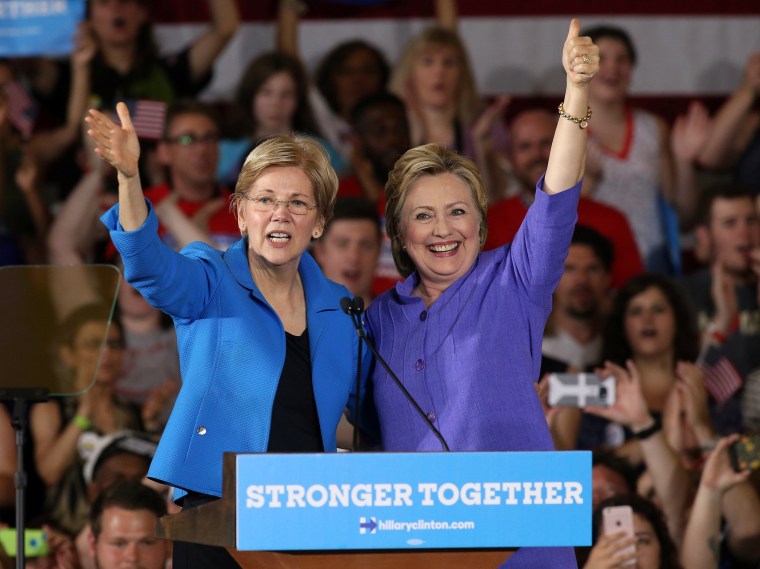The smart money may be on Hillary Clinton making a safe, Tim Kaine-ish choice for her running mate, but Democratic voters would be more eager to chip in their own money to support Clinton if she picks Elizabeth Warren, according to a new survey shared with NBC News.
Small-dollar donations to a candidate are one sign of voter enthusiasm. So Iowa-based polling firm RABA Research asked Democratic and Republican voters which potential vice presidential candidates would make them more likely to donate $5 to Clinton or Donald Trump’s campaign.
Bernie Sanders was the top choice for Democrats, with 35 percent picking him, but there’s no indication Clinton is actually considering her primary rival for the spot. Warren, who NBC News has confirmed is being vetted by the Clinton campaign, was a close second choice at 30 percent.
The Massachusetts senator was followed by others said to be on Clinton’s menu of choices: New Jersey Sen. Cory Booker (16 percent), Housing Secretary Julian Castro (14 percent), Ohio Sen. Sherrod Brown (11 percent), Virginia Sen. Tim Kaine (10 percent), Labor Secretary Tom Perez (9 percent) and California Rep. Xavier Becerra (6 percent). Respondents could select multiple options.
Related: Clinton and Warren Demonstrate Power of Their New Alliance
Kaine, a former governor, is the odds-on pick of many analysts, but some in Clinton’s orbit worry he doesn't have the "zing" to excite voters. “Boring is the fastest-growing demographic in this country,” Kaine joked on NBC’s “Meet the Press” Sunday.
An important caveat: Name recognition could also be a factor in these responses, since many of the potential picks are not well known.
Meanwhile, the Republican side is more unsettled, with two-thirds picking “none of the above,” compared to 48 percent of Democratic respondents.
GOP voters’ top three choices in the survey -- Dr. Ben Carson (13 percent), House Speaker Paul Ryan (12 percent) and Ohio Gov. John Kasich (10 percent) -- have either said they’re not interested in sharing a ticket with Trump or thought to not be in consideration.
Former House Speaker Newt Gingrich, a more likely running mate, comes in fourth with 9 percent of respondents saying they’d chip in $5 if Trump chose him. Gingrich was followed by Sarah Palin (8 percent), Chris Christie (7 percent), New Mexico Gov. Susana Martinez (5 percent), Sen. Jeff Sessions (3 percent), Sen. Joni Ernst (2 percent), and Sen. John Thune (2 percent).
Trump’s thinking on running mates is murky, since he is taking a nontraditional approach to the selection, but Thune and Christie are in the top tier, according to NBC News, along with Sen. Bob Corker and Florida Gov. Rick Scott, whose names did not appear on the survey.
Related: Who Will Donald Trump Pick as His VP?
Online donations have become a major source of campaign cash, with Obama raising $690 million online in 2012 and Mitt Romney coming close to $200 million.
“This response indicates Hillary Clinton could dramatically increase her current fundraising advantage over Donald Trump were she to pick Bernie Sanders or Elizabeth Warren,” said Brad Anderson, a former Obama adviser and partner at RABA Research. “As for Trump, voters appear unenthused when presented with vice presidential prospects, meaning he might have to reach far outside the box to harness online donor enthusiasm.”
RABA was founded by a bipartisan group of veteran Iowa operatives, including Republicans David Kochel and Tim Albrecht and Democrats Anderson and John Davis.
The national poll surveyed 626 participants online, where most small donations are made, on June 27, 2016. The margin of error is +/- 4. Those who said they would not considering making a donation at all were removed from the rest of the survey.

